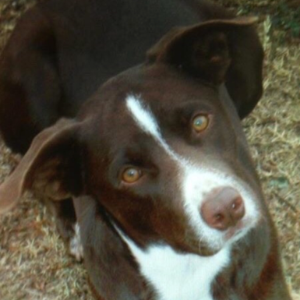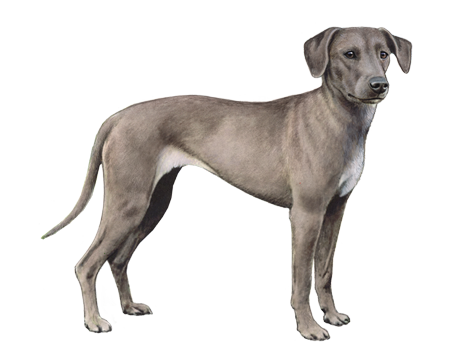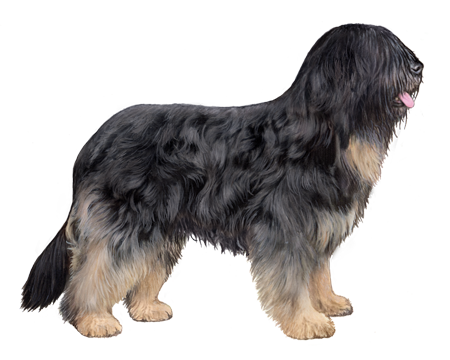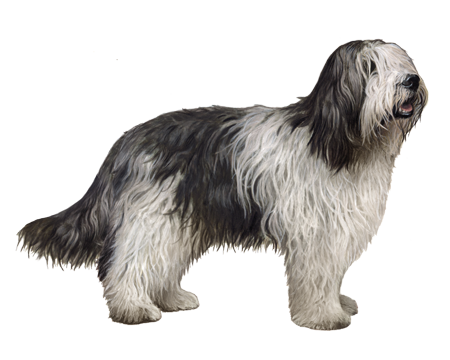
McNab
McNabs are energetic, intelligent working dogs that require tasks to keep their minds and bodies engaged. The breed is known to form tight bonds with its owners and might choose one person as the singular focus of its affection.
Interested in discovering if your dog is a McNab?
Check out Wisdom Panel's DNA tests.

McNab Traits
General Appearance
The McNab is an off-square, almost rectangular dog with an athletic build. A little more long than tall, the breed is of medium bone and adequate substance without being heavy, weedy, or low-slung.
Coat and Coloring
The McNab has a short, protective undercoat and a short, smooth, weather-resistant topcoat of medium length that either lies close to its body or slightly away—but is never plush or completely off-standing. It has a coarse, dense, and glossy texture. The hair is slightly longer on the tail and around the neck, forming a light ruff; dogs may also show furnishing on the tail, back of the hind limbs, and the ears.
The McNab's coat can be solid, bi-color or tri-color, and the white markings may be clear or have some ticking.
Distinctive Physical Traits
These are sturdy dogs with broad, muscular backs; long, well-sprung ribs; strong, sturdy, and muscular hindquarters that allow them to move with balance, agility, and endurance. The McNab also has oval-to-round, compact feet; a medium-sized, powerful muzzle that tapers toward the nose; and medium-sized, triangular ears set somewhat apart on their skulls. Its oval-to- almond-shaped eyes are hazel, amber, or dark brown in color, lending these dogs keen, watchful, and intelligent expressions.
McNab Temperament
Like other working dog breeds, McNabs are eager, intelligent, and energetic. These dogs can work long hours without a break and excel in their roles as shepherds and flock guardians. Work is essential to their happiness and, without it, McNabs can develop behavioral issues. McNabs do best in homes where their owners are active and committed to providing the mental and physical stimulation the breed needs to thrive.
McNabs are affectionate and loyal but might not make the best family dogs. Their strong herding tendencies could lead them to chase cars, corral children, or herd other pets. Additionally, McNabs tend to bond closely to a single person instead of spreading their affections around to the entire family. The breed is also known for being aloof, but not aggressive, around strangers.


McNab History
Scotsman Alexander McNab loved Scotch Collies for their strong work ethic and endless stamina, and missed the breed after he moved to California. In 1866, McNab returned to his native land where he purchased two Scotch Collies and brought them back to America to work his ranch.
McNab bred the Scotch Collies with local dogs of Basque and English origins, developing a breed with the same strength, stamina, and herding abilities but smooth coats that were better suited to the California climate. He called the new breed the McNab. (It is also known as the McNab Border Collie, McNab Herding Dog, McNab Sheepdog, and McNab Shepherd).
From these affectionate beginnings, the McNab developed a following among ranchers. It is now a well-known breed in the sheep-herding world, and excels in dog events such as agility.
McNab Care
Nutrition
Feed McNabs a high-quality dog food that is appropriate for their life stage (puppy, adult, senior) and consider a diet formulated for active breeds. With adequate exercise, this energetic breed might not become overweight, but portioning out their food with a measuring cup and limiting treats to no more than 10% of their daily calories can help keep McNabs fit and trim.
Grooming
Brush McNabs at least once per week to remove dead hair and keep their coats free of tangles, mats, and debris. During spring and fall when these dogs blow their coats, brush them with an undercoat rake several times per week. Keep their ears clean and their nails trimmed.
Like all breeds, McNabs benefit from a regular dental care routine that includes at-home teeth brushing and professional cleanings.
Exercise
McNabs are high-energy dogs that require considerable amounts of exercise; a walk around the block is not going to cut it for this active breed. While these working dogs prefer to be tackling a task, regular outdoor activities such as running, hiking, swimming, and trips to the dog park can help McNabs burn off their energy. These highly intelligent pups also excel in dog sports such as agility, obedience, rally, and herding. Without adequate exercise, McNabs will get bored and could become destructive or neurotic.
Training
Training is a must for McNabs. These dogs are intelligent and eager to learn, which allows them to quickly master basic commands and learn new tricks. Training can also help channel their boundless energy in positive directions. Getting the entire family involved with training could facilitate stronger bonds with these fickle dogs. Focus on positive reinforcement and rewards-based training and avoid repetitive activities, which will cause McNabs to lose interest in training.
McNabs tend to be wary of strangers; socialization can help. Provide opportunities for these dogs to interact with new people, pets, and places, which provides important mental stimulation and encourages them to grow comfortable with unfamiliar people and situations.

McNab Genetic Health Conditions
-
MDR1 Medication Sensitivity
The MDR1 gene variant causes a defect to a drug pumping protein that plays an important role in limiting drug absorption and distribution (particularly to the brain). Dogs with the MDR1 variant may have severe adverse reactions to some commonly used medications.
Knowing if your McNab is a carrier or at-risk for these conditions can help you and your veterinarian plan for your pup’s lifelong care. With Wisdom Panel™ Premium, you can get results for over 200 genetic health tests.
Breed Group
Herding
The herding group is a diverse category. These highly intelligent breeds were developed to guard and control the movement of livestock.





































































